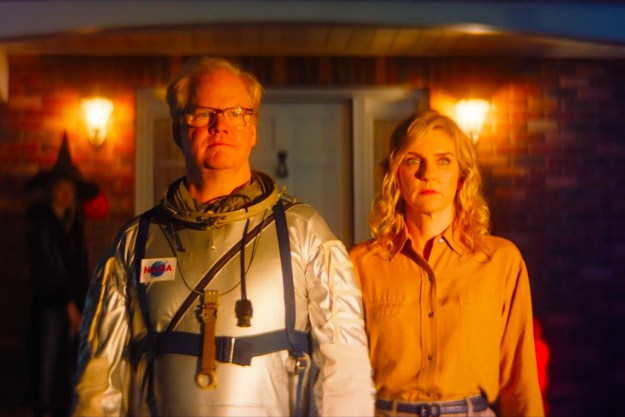
“Linoleum is a layered and gently moving sci-fi dramedy that doesn't make all of the shots it takes, but still leaves a lasting impression.”
- Jim Gaffigan's dual lead performances
- Rhea Seehorn's moving supporting turn
- Colin West's ambitious, unpredictable screenplay
- An often confusing first act
- Several jarring moments of tonal inconsistency
There’s more going on in Linoleum than meets the eye. The new feature from writer-director Colin West initially seems like a fairly standard, if quirky sci-fi dramedy. The film’s early moments of surrealness, which include one instance in which a red convertible seemingly falls from the sky, help imbue Linoleum with a Michel Gondry-esque sense of playfulness. What’s less clear, at first, is if those moments are anything more than merely stylistic flourishes on the part of West.
It wouldn’t have mattered much if that’s all they were, either. For most of its 101-minute runtime, Linoleum tells its story of quiet heartbreak and overwhelming melancholy so effectively that it’s easy to imagine a world in which it could have safely stuck to the initial parameters of its plot. The film, however, attempts to pull off a trick that’s not only difficult to see coming, but that retroactively reveals the layers in Linoleum’s story that were hidden within it all along.

Those same layers are hidden within Linoleum’s leading man, Cameron Edwin (Jim Gaffigan), the host of a local children’s science show who is haunted by his unfulfilled dreams of becoming an astronaut. When Linoleum begins, Cameron’s marriage to Erin (Better Call Saul‘s Rhea Seehorn), his former cohost, is on the verge of falling apart. In case that’s not enough, he’s also been forcibly replaced as the host of his show by Kent Armstrong (also played by Gaffigan), whose reputation as a more successful scientist only makes his appointment as Cameron’s replacement that much more insulting.
Cameron’s life is seemingly turned further upside down when part of a NASA rocket crash lands in his backyard one night. Seeing the event as an opportunity to do something “fantastic” and finally fulfill the dreams of his youth, Cameron begins to repair the capsule in his garage in the hopes of using it to fly to the moon. What he doesn’t realize is that doing so could very well be the thing that either breaks his and Erin’s relationship forever or brings them back together.
Linoleum takes its time revealing which outcome awaits Cameron and Erin. For its first 90 minutes or so, the film patiently builds the emotions of its story. A handful of frank conversations between co-workers and family members help establish the middle-aged melancholy infiltrating Erin and Cameron’s lives. West, meanwhile, builds a gentle, all-encompassing sense of regret and heartbreak by frequently cutting to scenes from some of Cameron’s Bill Nye-inspired public broadcasts, including some of the shows that he and Seehorn’s Erin once put on together.

West effectively juxtaposes Cameron and Erin’s moments of disconnection with the various nighttime adventures that their teenage daughter, Nora (Katelyn Nacon), has with Kent’s son, Marc (Gabriel Rush). Like so much of Linoleum, Nora and Kent’s scenes together are composed out of a series of hazy, dreamlike images that feel undeniably reminiscent of the way that Gondry handled the memory scenes in Eternal Sunshine of the Spotless Mind.
West’s decision to execute these scenes this way not only fills Nora and Marc’s moments together with a sense of nostalgic, innocent romance, but it also makes Linoleum feel just as much like a memory piece as it does a quaint sci-fi adventure. Linoleum’s occasionally fractured style and overall structure don’t always work as well as West intends, though. There are moments throughout the film’s first and second acts, in particular, that are so abruptly confusing that they end up pulling you straight out of its story.
The film doesn’t ever pause on these moments for too long, which makes it easy to brush off many of Linoleum’s unexplained moments of magical realism. For the most part, West does manage to eventually justify Linoleum’s unusual tone and structure, though he never quite communicates as strong of a hold on the film’s story as one would like. The dramedy’s nesting doll of a narrative ultimately feels just a bit too big and ambitious for West to handle. Fortunately, the writer-director’s clear passion for the film’s story prevents its unwieldy nature from completely derailing it.

Across the board, the film’s cast members all rise up to match Linoleum’s quiet tone and style. Gaffigan pulls off an impressive feat with his dual performances as Cameron, a kindhearted dreamer, and Kent, a stern, militaristic father and scientist. Opposite him, Seehorn turns in a subtle, lived-in performance as Erin, a woman who still isn’t quite sure which direction she’d like her life to take. Together, the two performers help West create a portrait of a relationship that’s brimming with both love and regret.
After spending much of its runtime setting up a fairly straightforward resolution to Erin and Cameron’s problems, West then sends Linoleum careening into much more abstract and emotional territory. The work put in by Gaffigan, Seehorn, Nacon, and Rush pays off in Linoleum’s closing minutes, which attempt to combine the film’s odd, overarching sense of nostalgia with the emotional foundation laid by its cast. The result is a climax that’s just as strange and unwieldy as it is unexpected and moving — and it helps lift Linoleum up above many of the other quirky, low-budget sci-fi flicks that usually come out every year.
The film, in other words, may not be quite as successful as some of the movies that it was influenced by, but that doesn’t stop Linoleum from soaring to some genuinely surprising and emotionally profound heights.
Linoleum is now playing in theaters.
Editors' Recommendations
- The best sci-fi movies on Hulu right now
- 7 best sci-fi sequels ever, ranked
- 3 sci-fi movies on Tubi you need to watch in March
- Like Christopher Nolan’s sci-fi classic Inception? Then watch these great movies now
- Like Netflix’s Spaceman with Adam Sandler? Then watch these three great sci-fi movies now



